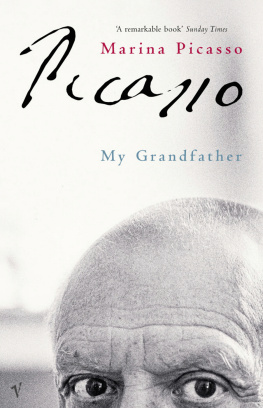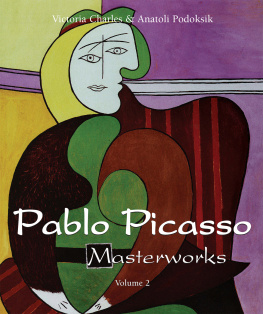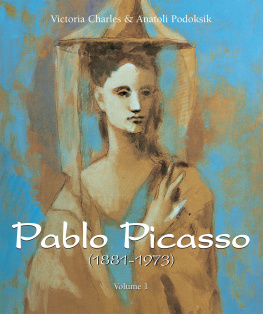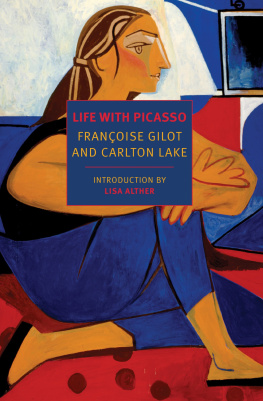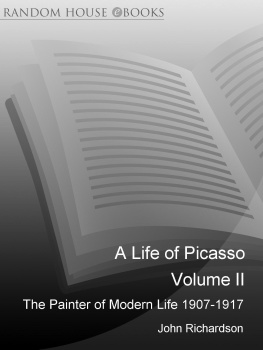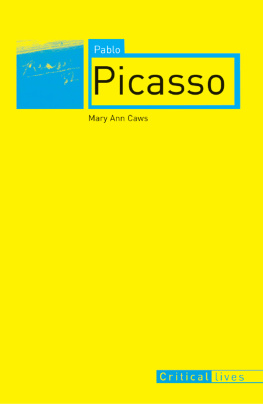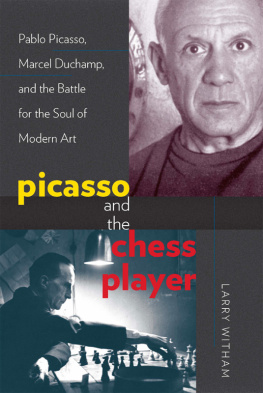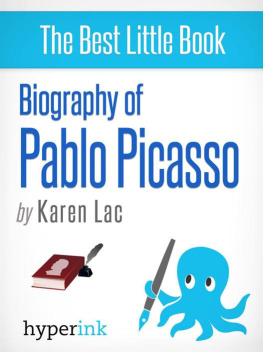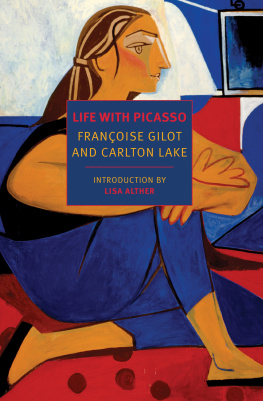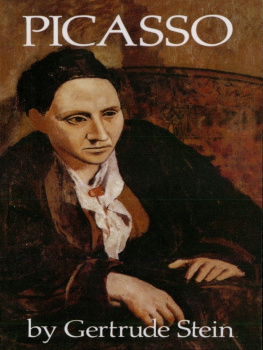Contents
About the Book
Marina Picasso remembers being six years old and standing awkwardly in front of the gates of Picassos grand house near Cannes. She was there with her father and eight-year-old brother to collect from her grandfather the weekly allowance that Picasso grudgingly gave his eldest son to support his family. Sometimes they were sent away and on other occasions, the gates would be opened and they would walk into the intimidating, exciting chaos of Picassos studio to face the man himself and his unpredictable moods.
Looking back, Marina can understand why Picasso had so little interest in his grandchildren; but at the time, she and her brother longed for him to love and understand them. Just a few miles away down the Cte dAzur, they led a hand-to-mouth existence. Her father was a weak man, reliant on his father for everything and her mother lived in her own fantasy world; the family were therefore utterly dependent on Picasso.
People assumed they were rich and privileged because they were Picassos and they were to live their lives under the burden of these assumptions. It was this that caused Marinas brother to commit suicide and when her father died Marina found herself in the ironic position of being one of the major heirs to Picassos estate.
About the Author
Marina Picasso is the founder of several charitable organisations that help underprivileged children in Vietnam. She has five children, including three adopted Vietnamese children, and lives in La Californie, the villa in the South of France that she inherited from Picasso.
To make a dove, you must first wring its neck.
PICASSO
Picasso: My Grandfather
Marina Picasso
Translated By Catherine Temerson

This ebook is copyright material and must not be copied, reproduced, transferred, distributed, leased, licensed or publicly performed or used in any way except as specifically permitted in writing by the publishers, as allowed under the terms and conditions under which it was purchased or as strictly permitted by applicable copyright law. Any unauthorised distribution or use of this text may be a direct infringement of the authors and publishers rights and those responsible may be liable in law accordingly.
Epub ISBN: 9781409058540
Version 1.0
www.randomhouse.co.uk
Published by Vintage 2002
2 4 6 8 10 9 7 5 3 1
Copyright Editions Denol 2001
Written with the collaboration of Louis Valentin
English translation Catherine Temerson 2001
Vincent OSullivans translation of Baudelaire is taken from Baudelaire in English, ed. Carol Clark & Robert Sykes (Penguin Books, 1997)
Marina Picasso has asserted her right under the Copyright, Designs and Patents Act, 1988 to be identified as the author of this work
First published in Great Britain by
Chatto & Windus 2001
Vintage
Random House, 20 Vauxhall Bridge Road,
London SW1V 2SA
The Random House Group Limited Reg. No. 954009
A CIP catalogue record for this book is available from the British Library
ISBN 9780701173609
To my children, with all my heart,
in alphabetical order
Dimitri
Flore
Florial
Gal
May
1
THERES NO RUNNING away from Picasso. I know that. I have never succeeded. But when I had my breakdown, I still hadnt realized this.
It must have been one oclock in the afternoon. I was in Geneva, driving down the Quai Gustave-Ador in a steady flow of traffic, taking my children, Gal and Flore, to school. On my right was the lake Geneva and its famous Jet dEau.
The lake... the cars... the Jet dEau... and, suddenly, I was in the grip of a violent panic attack. My fingers contracted in an unbearable cramp. I felt a burning spasm in my chest. My heart was pounding. I was suffocating. I was going to die. I had just enough time to tell the children to stay calm before I collapsed with my head on the wheel. Paralysed. Was I going mad?
I had stopped the car right in the middle of the road. Other cars sped by, almost grazing mine, honking at me to move on. No one stopped...
After half an hour of anguish, I managed to re-start the car, park it on the kerb and drag myself over to the petrol station a few yards away. I had to call for help. I didnt want to be put away. What would happen to my children?
You need therapy, the doctor said.
Things were so bad I had nothing to lose.
So began my analysis. It would last fourteen years. Fourteen years of uncontrollable tears, fainting fits and screams. I writhed in pain as I inched my way back in time to relive the things that had destroyed me silent, then stammering finally to express what had been buried deep within the little girl and then the adolescent... and had eaten her alive.
Fourteen years of misery to rectify so many years of unhappiness.
Because of Picasso.
Picassos quest for the absolute entailed an implacable will to power. His extraordinary work demanded human sacrifices. He engulfed anyone who got near him, and drove them to despair.
No one in my family managed to escape his stranglehold. He needed blood to sign each of his paintings: my fathers blood, my brothers, my mothers, my grandmothers, and mine; the blood of all those who loved him people who thought that they loved a human being, whereas instead they loved Picasso.
My father was born under the yoke of his tyranny; he died from it betrayed, disappointed, demeaned. Destroyed.
My brother Pablito, the plaything of Picassos sadism and indifference, committed suicide at twenty-four by drinking a lethal dose of bleach. I found him lying in his own blood, his oesophagus and larynx burned, his stomach wrecked, his heart adrift. I held his hand for three months at La Fontonne Hospital in Antibes as he lay slowly dying. With this horrendous act he had wanted put an end to his suffering and to bypass the problems awaiting him. Problems that awaited me too, for we were the stillborn descendants of Picasso, trapped in a spiral of mocked hopes.
My grandmother Olga, humiliated and degraded by so much betrayal, ended her life paralysed. Not once did my grandfather come to see her when she was bedridden and in distress. Yet she had given up everything for him her country, her career, her dreams and her pride.
As for my mother, she wore the name Picasso like a badge, a badge that lifted her to the highest rungs of paranoia. In marrying my father she had married Pablo Picasso. In her delirium, she could not accept the fact that the great man didnt want to see her or give her the grand life she deserved. Fragile, lost and unstable, she had to make do with part of the meagre weekly allowance which my grandfather paid to keep his son and grandchildren under his domination and on the verge of poverty.
I wish that I could live without this past.
Its a Thursday in November. My father is leading me by the hand. Silently, he walks up to the forbidding gate which protects La Californie, my grandfathers house. My brother Pablito follows, hands clasped behind his back. I am six, Pablito nearly eight.
My father rings the bell. I am afraid, as I always am each time we come. There is the sound of footsteps, then a key turning in the lock and La Californies concierge, an elderly Italian worn by servitude, appears behind the half-open gate. He looks us over and says to my father, Do you have an appointment, Monsieur Paul?
Yes, my father stammers.
He has let go of my hand so I wont feel how moist his palm is.
Good, the elderly concierge replies, Ill see if the Matre can receive you.
Next page
